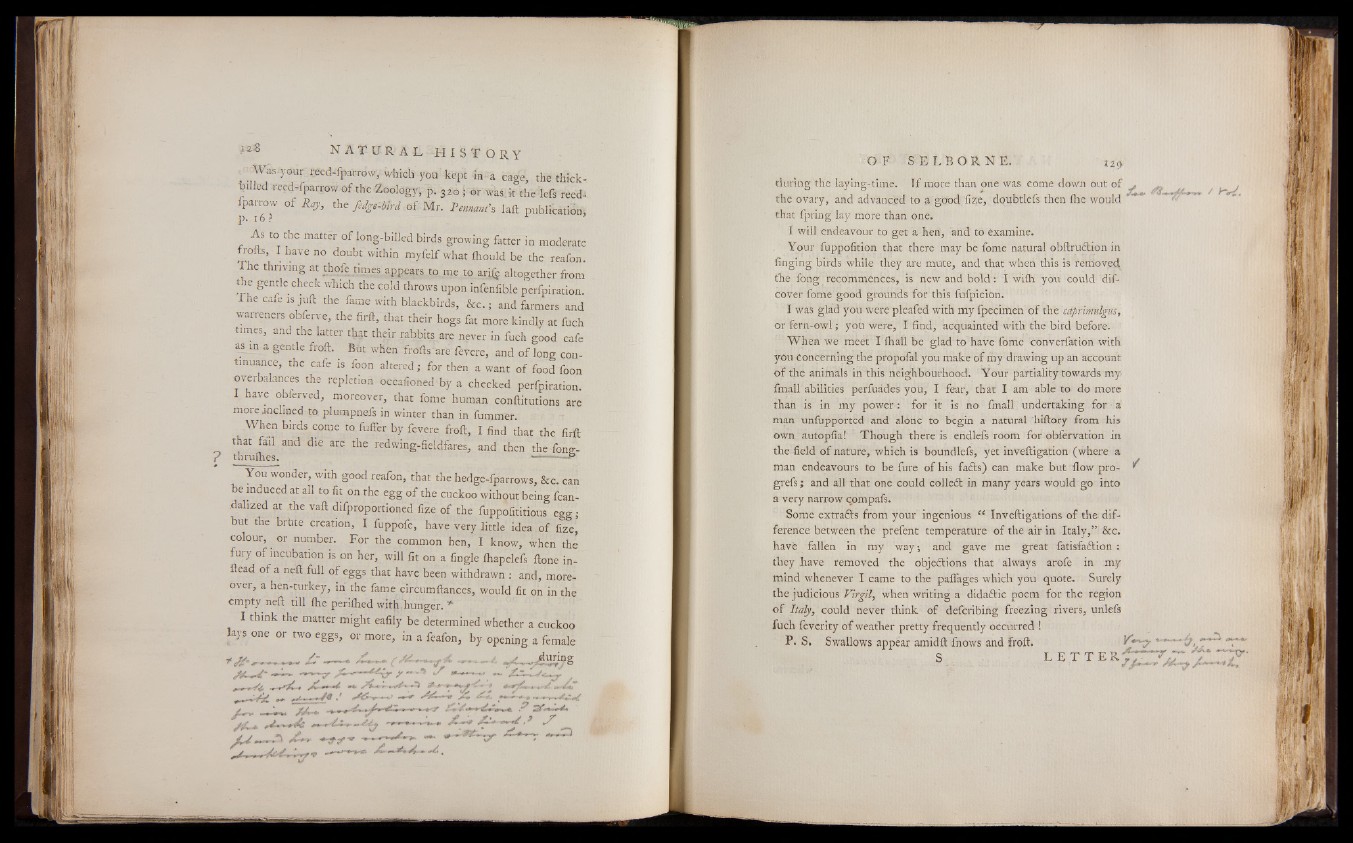
Was.yonr reed-fparrowy which you' kept to- a cage, the thick-
allied reed-fparrowof the Zoology^ p- 3201 or wks;k theTefs' reedfparrow
of Ray, the fedgeMrd o î Mr. Pennant’s laft publication,
p. 16 ? — ■ _ r ’
As to the matter of long-billed birds growing fatter in moderate
trolts, I have no doubf within myfelf what Ihould be the reafon.
The thriving at thofc timest appears _t0, me to arÿe altogether from
t e gentle check which the cold throws upon infenfible perfpiration.
The cafe is juft the fame with blackbirds, & c .; and farmers and
warreners obferve, the firft, that their hogs fat more kindly at fuch
times, and the latter thgt their rabbits are never in fuch good cafe
asjn a gentle froft. Bût when frofts are fevere, and of long continuance,
the cafe is foon altered ; for then a want of food foon
overbalances the repletion occafioned by a checked perfpiration.
I have obferved, moreover, that fome human conftitutions are
more jnchned to plumpnefs in winter than in fummer.
When birds come to fuffer by fevere froft, I find that the firft
that fail and die are the redwing-fieldfares, and then the fong-
thrulhes. . — ■ p
You wonder, with good reafon, that the hedge-fparrows, &c. can
be induced at all to fit on the egg of the cuckoo without being fcan-
dalized at the vaft difproportioned fize of the fuppofititious egg;
but the briite creation, I fuppofe, have very little idea of fize,
colour, or number. For the common hen, I know, when the
fury of incubation is on her, will fit on a Angle fhapelefs ftone in-
ftead of a neft full of eggs that have been withdrawn : and, moreover,
a hen-turkey, in the fame circumftances, would fit on in the
empty neft till (he perilhed witji, hunger. *
I think the matter might eafily be determined whether a cuckoo
lays one or two eggs, or more, in a feafon, by opening a female
- * — |f
I » 1 - —
*"*
******
-— ^ •'
■ » > M ,/SR I * ' *'"d
0y , ». r - v ~~ * 1
during the laying-time. Tf more than one was come down out of
the ovary, and advanced to a good fize, doubtlefs then Ihe would
that fpring lay more than one.
f will endeavour to get a hen, and to examine.
Your fuppofition that there may be fome natural obftrudtion in
linging birds while they are mute, and that when this is removed
the fong recommences, is new and bold: I wilh you could dif-
cover fome good grounds for this fufpicion.
I was glad you were pleafed with my fpecimen of the cdprimulgus,
or fern-owl; you were, I find, acquainted with the bird before.
When we meet I (hall be glad to have fome converfation with
you concerning the propofal you make of my drawing up an account
of the animals in this neighbourhood. Your partiality towards my.
fmall abilities perfuades you, I fear, that I am able to do more
than is in my power: for it is no fmall undertaking for a
man unfupported and alone to begin a natural hiftory from his
own autopfia! Though there is endlefs room for obfervation in
the field of nature, which is boundlefs, yet inveftigation (where a
man endeavours to be fure of his fadts) can make but flow pro- '
grefs; and all that one could collect in many years would go into
a very narrow compafs.
Some extrafts from your ingenious “ Inveftigations of the difference
between the prefent temperature of the air in Italy,” &c.
have fallen in my way; and gave me great fatisfadtion :
they have removed the objections that always arofe in my
mind whenever I came to the paflages which you quote. Surely
the judicious Virgil, when writing a didadtic poem for the region
of Italy, could never think of defcribing freezing rivers, unlefs
fuch feverity of weather pretty frequently occurred ! c
P. S. Swallows appear amidft fnows and froft. P**;
S L E T T E R ^